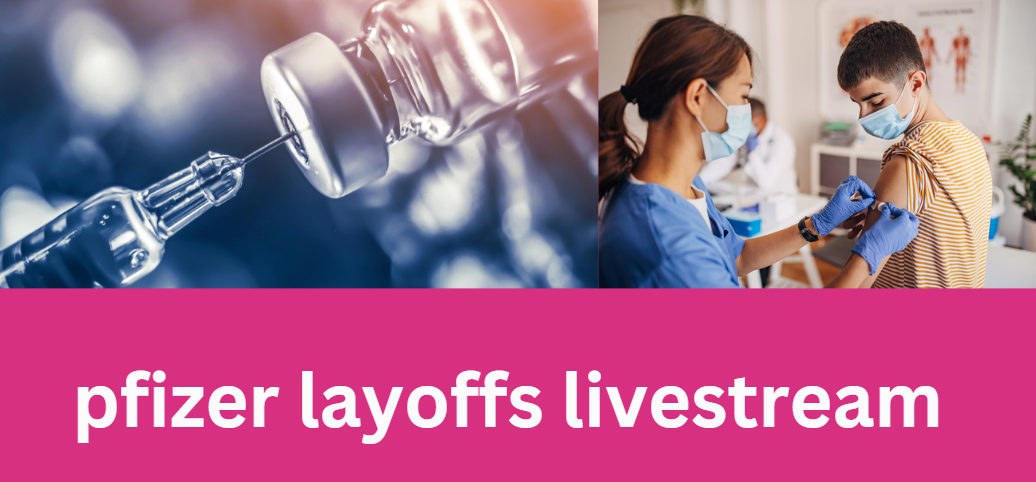Pfizer Layoffs Livestream: An In-Depth Analysis
Contents
- 1 Introduction
- 2 Background: Pfizer and Its Workforce
- 3 The Controversial Pfizer Layoffs Livestream
- 4 Ethical Considerations in Remote Layoffs
- 5 The Impact on Pfizer’s Reputation
- 6 The Broader Implications for Corporate America
- 7 Lessons Learned and Moving Forward
- 8 FAQs About the Pfizer Layoffs Livestream
- 8.1 1. What was the Pfizer layoffs livestream?
- 8.2 2. Why did Pfizer use a livestream to announce layoffs?
- 8.3 3. How did employees react to the Pfizer layoffs livestream?
- 8.4 4. What are the ethical concerns surrounding remote layoffs?
- 8.5 5. What impact has the Pfizer layoffs livestream had on the company’s reputation?
- 9 Conclusion
Introduction
The phrase “Pfizer layoffs livestream” recently became a hot topic in corporate America, particularly following a controversial event that sparked widespread outrage among Pfizer employees and the general public. This event not only highlighted the growing trend of remote layoffs but also brought to light the ethical concerns surrounding how large corporations handle downsizing.
This article will delve into the intricacies of the Pfizer layoffs livestream, providing detailed analysis and insights that go beyond what’s already available online. We will explore the context, reactions, implications, and broader impacts of this incident, aiming to provide a comprehensive understanding of the situation.
Background: Pfizer and Its Workforce
Pfizer’s Role in the Global Economy
Pfizer is one of the world’s leading pharmaceutical companies, known for its contributions to healthcare and medicine, including the development of the COVID-19 vaccine. With a global workforce that spans various regions, Pfizer plays a significant role in both the economy and public health. The company’s operations are vast, involving research and development, manufacturing, and distribution of pharmaceuticals, vaccines, and consumer healthcare products.
The Context Leading to Layoffs
Despite its success, Pfizer, like many large corporations, has had to make difficult decisions regarding workforce management. The pharmaceutical industry is highly competitive and subject to fluctuations in market demand, regulatory changes, and financial pressures. In recent years, Pfizer has undergone several restructurings to streamline operations and maintain profitability, which has unfortunately led to job cuts.
The Decision to Streamline Operations
Pfizer’s decision to lay off employees is not unprecedented. However, what sets this incident apart is the manner in which it was executed—a livestream that has been described as “casual” and “insensitive,” drawing parallels to the infamous Better.com CEO’s handling of layoffs via a Zoom call.
The Controversial Pfizer Layoffs Livestream
The Livestream Event
On [insert date], Pfizer held a livestream to announce layoffs within the company. This method of communication, while increasingly common in the era of remote work, was met with significant backlash. Employees who were affected by the layoffs reported feeling blindsided and disrespected by the impersonal nature of the announcement.
Employee Reactions
The reaction from Pfizer employees was swift and negative. Many took to social media and internal company forums to express their frustration and anger. The livestream was criticized for being “cold” and “impersonal,” with employees describing the experience as dehumanizing. Some employees felt that the company’s leadership was detached from the realities of those who were losing their jobs, further exacerbating feelings of betrayal and disappointment.
Comparisons to Better.com CEO’s Gaffe
The Pfizer layoffs livestream has been compared to a similar incident involving Better.com, where the CEO, Vishal Garg, laid off 900 employees in a Zoom call. Like the Pfizer event, the Better.com incident was widely criticized for its lack of empathy and poor handling of such a sensitive situation. These comparisons have only fueled the controversy surrounding Pfizer’s approach, drawing attention to the need for more compassionate and thoughtful communication during layoffs.
Ethical Considerations in Remote Layoffs
The Rise of Remote Layoffs
The COVID-19 pandemic has accelerated the shift to remote work, and with it, remote layoffs have become more common. Companies now use virtual meetings and livestreams to communicate with employees, including delivering the difficult news of job cuts. While this approach can be efficient, it raises significant ethical concerns about how employees are treated during these transitions.
The Human Element in Layoffs
One of the key criticisms of the Pfizer layoffs livestream is the apparent lack of consideration for the human element. Layoffs are a deeply personal and emotional experience for those affected, and delivering such news via a livestream can strip away the dignity and respect that employees deserve. This event has sparked a broader conversation about the ethics of remote layoffs and the responsibilities of employers to handle such situations with care and empathy.
The Corporate Responsibility
Companies like Pfizer have a responsibility to their employees, not just in terms of providing fair compensation and benefits, but also in how they handle difficult situations like layoffs. The Pfizer layoffs livestream has raised questions about corporate responsibility and the need for companies to prioritize the well-being of their employees, even in challenging times.
The Impact on Pfizer’s Reputation
Public Perception
The controversy surrounding the Pfizer layoffs livestream has had a noticeable impact on the company’s public perception. Pfizer, which had gained significant goodwill due to its role in developing the COVID-19 vaccine, now faces criticism for its handling of the layoffs. This incident has highlighted the fragile nature of corporate reputation and how quickly it can be damaged by perceived missteps.
Media Coverage
The media coverage of the Pfizer layoffs livestream has been extensive, with many outlets drawing attention to the parallels with the Better.com incident. This coverage has not only amplified the voices of disgruntled employees but also brought the issue to a broader audience, further damaging Pfizer’s reputation.
Investor Reactions
While it is too early to fully assess the long-term impact on Pfizer’s stock price and investor confidence, the controversy could have implications for the company’s financial health. Investors may become wary of the potential for further negative publicity and the impact it could have on Pfizer’s business operations.
The Broader Implications for Corporate America
A Wake-Up Call for Employers
The Pfizer layoffs livestream serves as a wake-up call for corporate America. As remote work becomes more entrenched, companies must rethink how they handle layoffs and other sensitive communications. The backlash against Pfizer highlights the need for more thoughtful and compassionate approaches that prioritize the well-being of employees.
The Importance of Communication
Effective communication is crucial in any corporate setting, but it becomes even more critical during layoffs. Companies must ensure that their messaging is clear, empathetic, and respectful, regardless of the medium used. The Pfizer incident underscores the potential consequences of poor communication and the importance of getting it right.
The Role of Corporate Culture
Corporate culture plays a significant role in how companies handle layoffs. A culture that values transparency, empathy, and respect will likely approach layoffs in a way that minimizes harm to employees and preserves the company’s reputation. The Pfizer layoffs livestream has sparked discussions about the need for a cultural shift in many organizations to prioritize these values.
Lessons Learned and Moving Forward
The Need for Empathy
One of the key lessons from the Pfizer layoffs livestream is the importance of empathy in corporate decision-making. Companies must recognize that layoffs are not just business transactions but deeply personal experiences for those affected. Moving forward, organizations should strive to handle such situations with greater sensitivity and care.
Rebuilding Trust
For Pfizer, the challenge now is to rebuild trust with its employees and the public. This will require not only addressing the immediate fallout from the layoffs but also demonstrating a commitment to better practices in the future. Transparency, open communication, and a renewed focus on employee well-being will be essential in this effort.
The Future of Layoffs in a Remote World
As remote work continues to evolve, companies will need to adapt their strategies for handling layoffs. The Pfizer layoffs livestream has shown that simply replicating in-person processes in a virtual format is not sufficient. Organizations must develop new approaches that take into account the unique challenges and opportunities of the remote work environment.
FAQs About the Pfizer Layoffs Livestream
1. What was the Pfizer layoffs livestream?
The Pfizer layoffs livestream was a virtual event where Pfizer announced job cuts to its employees. The livestream was controversial due to its perceived lack of empathy and the impersonal way the layoffs were communicated.
2. Why did Pfizer use a livestream to announce layoffs?
Pfizer likely chose to use a livestream due to the shift toward remote work and the need to communicate with a large number of employees simultaneously. However, this method was criticized for being cold and impersonal.
3. How did employees react to the Pfizer layoffs livestream?
Employees reacted negatively to the livestream, expressing feelings of anger, betrayal, and disappointment. Many felt that the company’s leadership was out of touch with the realities of those losing their jobs.
4. What are the ethical concerns surrounding remote layoffs?
Remote layoffs raise ethical concerns because they can strip away the dignity and respect that employees deserve. The impersonal nature of virtual communications can make the experience even more distressing for those affected.
5. What impact has the Pfizer layoffs livestream had on the company’s reputation?
The Pfizer layoffs livestream has damaged the company’s reputation, drawing criticism from employees, the public, and the media. The incident has highlighted the need for better communication and more compassionate handling of layoffs in the future.
Conclusion
The “Pfizer layoffs livestream” controversy has brought to the forefront critical issues about how corporations handle layoffs, especially in a remote work environment. While the event itself was a significant misstep for Pfizer, it has also sparked an important conversation about the need for empathy, transparency, and ethical responsibility in corporate America.
As companies continue to navigate the challenges of remote work and economic uncertainty, the lessons learned from this incident will be invaluable in shaping more humane and effective approaches to workforce management.
In conclusion, the Pfizer layoffs livestream serves as a cautionary tale for corporations. It underscores the importance of prioritizing the human element in business decisions and the potential consequences of failing to do so. As we move forward, companies must recognize that how they handle layoffs and other sensitive issues will have lasting impacts on their reputation, employee morale, and overall success.

